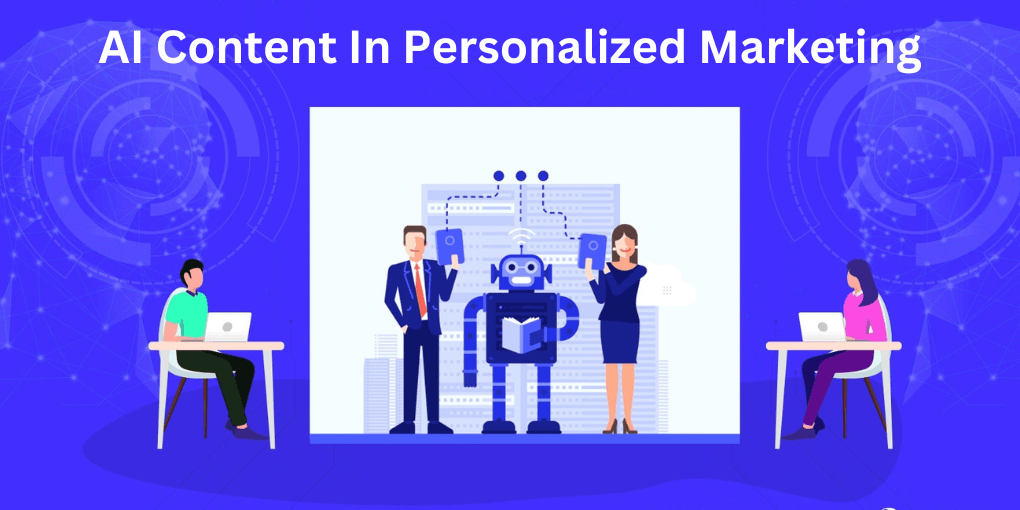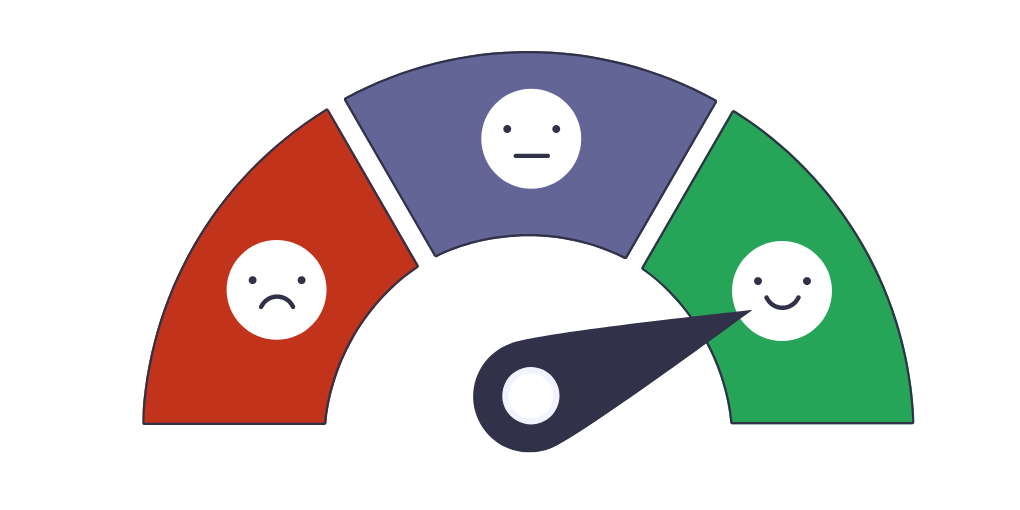In this fast-paced and hyper-connected world, traditional mass marketing approaches are no longer as effective as they used to be.

Consumers are constantly bombarded with generic advertisements and promotional materials that fail to resonate with their specific needs and interests.
This is where personalized marketing enters the scene, aiming to deliver tailored messages that capture the attention of individual consumers.
AI content plays a pivotal role in achieving this level of personalization.
Understanding Personalized Marketing
Before diving into the role of AI in personalized marketing, it’s essential to grasp the concept itself.
Personalized marketing revolves around crafting targeted messages and experiences for individual consumers, based on their preferences, behaviors, and demographics.
By understanding each customer’s unique characteristics, marketers can deliver highly relevant content that resonates with their needs and interests.
Personalized marketing can take various forms, such as personalized emails, customized product recommendations, or dynamically generated website content.
The Importance of AI in Personalized Marketing
In the world of marketing, personalization has become a key factor in achieving success.
Customers today expect tailored experiences that cater to their unique needs and preferences.
This is where AI (Artificial Intelligence) plays a crucial role. With its advanced algorithms and machine learning capabilities, AI enables businesses to deliver highly personalized marketing campaigns that resonate with individual customers.
Let’s explore the importance of AI in personalized marketing and how it transforms the way businesses engage with their audience.
Understanding Personalized Marketing
Personalized marketing focuses on creating targeted experiences and messages for specific individuals or customer segments.
It involves collecting and analyzing data about customers’ behaviors, preferences, and demographics to deliver relevant content.
This approach goes beyond generic mass marketing and acknowledges that each customer is unique, with distinct interests and needs.
The Power of AI in Personalization
AI empowers businesses to take personalized marketing to new heights by leveraging technology to understand and respond to customer behavior in real time.
Here’s why AI is so important in personalized marketing:
Advanced-Data Analysis
AI algorithms can process vast amounts of data at high speeds, allowing businesses to gain valuable insights into customer behavior.
By analyzing customer interactions, browsing history, purchase patterns, and social media activity, AI can identify patterns, trends, and preferences that enable precise targeting and personalization.
Real-Time Decision Making
AI enables real-time decision-making by automatically analyzing and interpreting data.
This means that businesses can respond to customer actions immediately, delivering personalized content and offers at the right moment.
Real-time personalization enhances the customer experience and increases the likelihood of conversions.
Predictive Analytics
AI algorithms can predict customer behavior and preferences based on historical data.
By utilizing machine learning techniques, AI models can identify trends and patterns that human analysis might miss.
This enables businesses to anticipate customer needs and proactively provide personalized recommendations and offers.
Automation and Efficiency
AI automates routine activities, giving marketers important time to concentrate on strategy and creativity.
From content creation to campaign optimization, AI-powered tools, and platforms streamline marketing processes, resulting in improved efficiency and productivity.
Hyper-Personalization at Scale
With AI, businesses can create hyper-personalized experiences for a large customer base.
By tailoring messages, recommendations, and offers to individual preferences, AI-driven personalization can significantly enhance customer engagement, satisfaction, and loyalty.
Enhanced Customer Experience
One of the primary benefits of AI in personalized marketing is the ability to create exceptional customer experiences.

By delivering relevant and timely content, businesses can engage customers on a deeper level, building trust and fostering long-term relationships.
When customers feel understood and valued, they are more likely to become brand advocates and loyal supporters.
Improved Targeting and Segmentation
AI helps businesses segment their customer base more effectively. Instead of relying solely on demographic information, AI algorithms consider individual behaviors, preferences, and purchase history.
This level of granularity allows businesses to target specific customer segments with highly tailored messages, resulting in higher response rates and conversions.
Dynamic Content Personalization
AI enables businesses to dynamically personalize content based on real-time data and customer interactions.
Websites, emails, and advertisements can adapt their content and recommendations to align with individual preferences, enhancing the overall user experience.
This dynamic personalization not only increases engagement but also improves the chances of driving desired actions from customers.
AI-Powered Content Creation
One of the key aspects of personalized marketing is creating content that resonates with individual customers.
AI plays a significant role in streamlining and enhancing the content creation process. Let’s explore some AI-powered techniques used in content creation.
Natural Language Generation (NLG)
Natural Language Generation is a subset of AI that focuses on generating human-like text.
NLG algorithms can analyze structured data and transform it into coherent narratives, articles, or product descriptions.
This technology enables businesses to automate the creation of personalized content based on user preferences and behavior data.
Content Personalization and Recommendation Systems
AI-powered recommendation systems analyze user behavior, historical data, and contextual information to suggest relevant content.
These systems can provide personalized product recommendations, curated playlists, or article suggestions based on individual preferences.
By leveraging AI, businesses can increase customer engagement and drive conversions by delivering content tailored to each user’s interests.
Benefits of AI-Generated Content
Implementing AI-generated content in marketing strategies offers several benefits for businesses. Let’s explore some of these advantages:
- Scalability and Efficiency: AI-powered content creation enables businesses to scale their marketing efforts without compromising quality. By automating the content generation process, marketers can create a vast amount of personalized content in a shorter timeframe. This scalability helps businesses reach a larger audience and maintain a consistent level of personalization.
- Increased Relevance and Engagement: Personalized content created with the help of AI algorithms tends to be highly relevant and engaging for individual customers. By tailoring the message to specific needs and interests, businesses can capture the attention of their target audience. Increased relevance leads to higher engagement, increased time spent on websites or platforms, and ultimately, improved conversion rates.
- Cost Savings: AI-generated content reduces the reliance on manual content creation processes, which can be time-consuming and costly. With AI automation, businesses can streamline content production, resulting in significant cost savings over time.
- Consistency and Brand Alignment: AI algorithms can consistently adhere to brand guidelines, ensuring that the generated content aligns with the brand’s voice and style. This consistency strengthens brand identity and helps maintain a cohesive customer experience across different touchpoints.
- Personalization at Scale: AI-generated content allows businesses to personalize messages for each customer at scale. By analyzing vast amounts of data, AI algorithms can create personalized recommendations, product descriptions, and marketing messages tailored to individual preferences. This degree of customization improves client happiness and boosts conversion rates.
Maintaining Authenticity and Brand Voice
While AI-generated content offers significant benefits, it’s crucial for businesses to maintain authenticity and align the generated content with their brand voice.

Here’s why maintaining authenticity is important and how businesses can achieve it:
- Consistency and Trust: Maintaining authenticity ensures consistency in brand messaging across all marketing channels. When customers encounter a consistent brand voice, they develop trust and loyalty toward the brand. Inconsistencies or a lack of authenticity can erode trust and confuse customers.
- Unique Identity: Every brand has a unique identity and personality that sets it apart from competitors. Authenticity helps businesses showcase their distinct values, tone, and style through their content. It enables customers to identify and connect with the brand on a deeper level.
- Customer Engagement: Authentic content resonates with customers on an emotional level, leading to increased engagement. When customers feel a genuine connection with a brand, they are more likely to interact, share, and advocate for the brand.
To maintain authenticity and brand voice while utilizing AI-generated content, businesses can follow these guidelines:
- Define Brand Guidelines: Clearly define your brand’s voice, tone, and values. Documenting these guidelines helps AI algorithms understand and generate content that aligns with your brand’s unique identity.
- Human Oversight: Involve human editors or copywriters to review and fine-tune AI-generated content. They can ensure that the generated content matches the brand’s voice, reflects the intended message, and maintains consistency.
- Training the AI Algorithm: Train the AI algorithm using existing content that exemplifies your brand’s voice and style. By incorporating your brand’s specific language patterns and vocabulary, you can guide the AI toward generating content that reflects your brand’s authenticity.
- Iterative Improvement: Continuously analyze and evaluate the AI-generated content. Incorporate feedback from customers and internal stakeholders to refine and improve the output. This iterative process helps align the generated content with your brand’s voice over time.
- Quality Assurance: Implement quality assurance measures to ensure that the AI-generated content meets your brand’s standards. This includes reviewing grammar, tone, and coherence to maintain a high level of quality and authenticity.
Strategies for Implementing AI-Generated Content
To leverage AI-generated content effectively in personalized marketing, businesses should consider the following strategies:
Data Collection and Analysis
To implement AI-generated content successfully, businesses need to collect and analyze relevant customer data.
This includes gathering data from various sources such as website analytics, customer surveys, social media interactions, and purchase history.
By gaining insights into customer preferences and behaviors, businesses can create personalized content that resonates with their audience.
Content Strategy Alignment
AI-generated content should align with the content strategy of the business.
It’s essential to define clear objectives, target audience segments, and messaging guidelines.
By aligning AI-generated content with the broader content strategy, businesses can ensure consistency and cohesiveness in their personalized marketing efforts.
Future Trends and Predictions

The role of AI content in personalized marketing is expected to grow significantly in the future. Here are some key trends and predictions:
- Advanced Natural Language Processing (NLP): AI algorithms will continue to improve in understanding and generating human-like language, enabling more sophisticated and personalized content creation.
- Voice-Activated Personalization: With the rise of voice assistants and smart speakers, AI-generated content will adapt to voice-activated interactions, delivering personalized experiences through spoken language.
- Enhanced User Profiling: AI algorithms will become more adept at creating detailed user profiles, considering not only demographics but also individual preferences, interests, and emotional states.
- Hyper-Personalization: AI will enable marketers to deliver hyper-personalized content in real time, providing tailored recommendations and offers at every customer touchpoint.
Conclusion
AI content plays a crucial role in personalized marketing by enabling businesses to deliver relevant and engaging content to individual customers.
Through AI-powered techniques such as natural language generation and content personalization, businesses can enhance customer experiences, improve targeting and segmentation, and overcome scalability challenges.
However, it’s essential to address concerns about the authenticity and ethical use of AI-generated content.
Successful examples from companies like Netflix and Spotify demonstrate the effectiveness of AI content in personalized marketing.
By implementing strategies for data collection, analysis, and content strategy alignment, businesses can leverage AI-generated content to drive customer engagement and achieve marketing success.

This blog post is written by AI Genie, Powered by ContentGeni’s cutting-edge AI technology. It is able to quickly and efficiently produce high-quality written content on a wide range of topics. While AI Genie may not have a physical body, it is constantly learning and evolving to provide the best possible content for its readers.